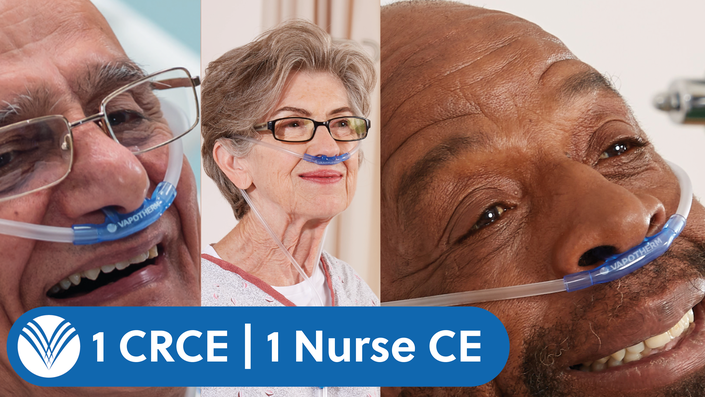
High Velocity Therapy Grand Rounds V: Hypercapnic Respiratory Failure
3 critical care and emergency medicine review case studies in which they used high velocity therapy to treat patients in hypercapnic respiratory distress
High Velocity Therapy is an advanced form of high flow. While traditional high flow therapy is often associated with oxygenation, high velocity therapy is cleared for use for hypoxemia and respiratory distress (i.e., hypercapnia). In the 5th in our series of continuing education Grand Rounds on high velocity therapy, Dr. Hinkley, MD FACEP will review the mechanisms of action of how this is done as well as the clinical evidence to support this. He, then, will have three critical care and emergency medicine review case studies in which they used high velocity therapy to treat patients in hypercapnic respiratory distress.
Objectives:
- Describe the mechanisms of action for high velocity therapy and how it compares to other non-invasive modalities.
- Understand the clinical evidence that supports the use of high velocity therapy for hypercapnia.
- Review case studies demonstrating the use of high velocity therapy for the adult patient in type II, hypercapnic, respiratory failure.
Respiratory Therapists can earn 1 AARC RT CRCE. Nurses can earn 1 Contact Hour.
Your Instructor

Dr. Rezai has been a Pulmonary Critical Care Specialist for 15 years plus and currently serves as the Director of Critical Care and Medical/Surgical Intensive Care Unit at Saint Barnabas Medical Center in Livingston, New Jersey. He is the President of the NJ Chapter Society of Critical Care Medicine. He is board certified in Internal Medicine, Critical Care Medicine, Neurocritical Care and Pulmonary Diseases. He is a Clinical Associate Professor at Rutgers, New Jersey Medical School. Dr. Rezai is an experienced user of Vapotherm high velocity therapy for the critical care patient.
Course Curriculum
Course: High Velocity Therapy Grand Rounds III: Increased Work of Breathing
Available in
days
days
after you enroll
Frequently Asked Questions
When does the course start and finish?
The course starts now and never ends! It is a completely self-paced online course - you decide when you start and when you finish.
How long do I have access to the course?
How does lifetime access sound? After enrolling, you have unlimited access to this course for as long as you like - across any and all devices you own.
How do I get my CRCE credit for this course?
After you watch the video lecture(s), pass the quiz and fill out the evaluation form, you will receive your electronic CRCE/CE certificate the same day. We notify the AARC of passed courses at the beginning of each month.
